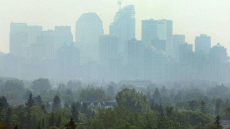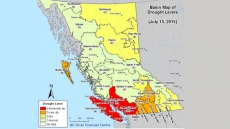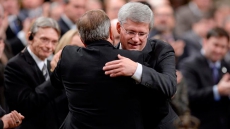OTTAWA — An emotionally and politically charged debate over Canada's refugee policy has exploded since the photo of a drowned three year old rocked the world this week.
Here's a look at how the process works:
There are different rules for those making refugee applications upon arrival in Canada and those applying from abroad.
People seeking refugee status while outside Canada, but not in their home country, also face specific rules.
There are two classes of refugees, according to Citizenship and Immigration Canada.
The first class must have a well-grounded fear of persecution, be referred by the United Nations High Commissioner for Refugees (UNHCR) or another referral agency, or be sponsored by a private sponsorship group.
In addition, they must be selected as a government-assisted or privately sponsored refugee, or have the funds needed to support themselves and any dependents after arrival in Canada.
The second class comprises victims of civil war or armed conflict, or those who have suffered massive violations of human rights.
They, too, require a referral from the UNHCR or another recognized organization — or be sponsored by a private sponsorship group.
In addition, they must be privately sponsored or have the money to support themselves and any dependents in Canada.

Both classes need to pass a medical exam and security and criminal checks.
Those who have another offer of protection or have citizenship and protection in another safe country are not eligible.
Sponsorships can fall into three categories: sponsorship agreement holders; community sponsors and groups of five.
The minister of Citizenship and Immigration also has the discretionary power to bypass the regular citizenship or refugee process and simply grant citizenship to individuals on compassionate grounds.
The UNHCR says a refugee is someone who "owing to a well-founded fear of being persecuted for reasons of race, religion, nationality, membership of a particular social group, or political opinion, is outside the country of his nationality and is unable to or, owing to such fear, is unwilling to avail himself of the protection of that country."
The Syria refugee crisis by the numbers
The image of three-year-old Alan Kurdi dead on a Turkish beach refocused attention on how the world is coping with the Syrian refugee tragedy — and the role Canada is playing.

Here are some numbers to consider:
4,088,078: The number of Syrian refugees who have fled their country since the outbreak of civil war in 2012, according to the latest data from the United Nations High Commissioner for Refugees.
2,000: The number of Syrian refugees who have drowned trying to reach Europe since 2011, according to a UN report released this week.
23 million: Syria's population before the civil war. The UN estimates that half the population has been displaced internally or fled the country.
2,374: The number of Syrian refugees that Canada has admitted through government assisted and privately sponsored refugee programs.
10,000: The number of additional Syrian refugees the Canadian government says it will accept by 2017.
$795,336.928: The shortfall in funding that the UN refugee agency faces this year. It has raised only 41 per cent of the $1.3 billion it says it needs to care for refugees in 2015.

$11,899,170: The amount Canada has contributed to the UN refugee agency for Syria this year. That ranks Canada seventh among about 30 donor countries or entities that are contributing.
$219,335,000: The amount the U.S. has contributed. It ranks first, followed by Kuwait at $101,890,000.






